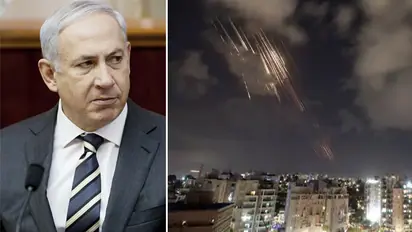Iran's missile strike on Israel: How much damage it caused, what PM Netanyahu said, IDF's next move and more

Synopsis
Iran launched over 180 ballistic missiles at Israel on October 2, with the Israeli government reporting that some of these were hypersonic Fattah missiles capable of reaching speeds of up to 10,000 mph. In response to the escalating situation, Israel announced an increase in troops for its ground invasion into southern Lebanon, urging residents of over 20 Lebanese villages to evacuate for their safety.
Tel Aviv: Iran launched over 180 ballistic missiles in an attack on Tuesday (Oct 2), according to the Israeli government. Among the missiles were hypersonic Fattah missiles, which can reach speeds of up to 10,000 mph. The Revolutionary Guards claimed that 90 per cent of the missiles successfully struck their intended targets. However, Israel contends that most of the missiles were intercepted by its air defense systems, a claim supported by statements from the UK and US, which contributed to Israel's defense efforts.
While no injuries were reported in Israel, one individual was killed in the occupied West Bank, according to local authorities. Photos also reveal missiles that fell in Ramallah, located in the West Bank.
IDF spokesperson Daniel Hagari mentioned that there were "a small number" of successful hits. The Israeli military released video footage showing significant damage to a school in the central city of Gadera caused by an Iranian missile.
According to reports, the missile fire began amid rising fears of retaliation from Iran following the recent assassination of Hezbollah leader Hassan Nasrallah in an Israeli airstrike. Initial footage captures the chaotic scene as interceptions and falling shrapnel are observed in various locations, including Tel Aviv, the Dead Sea region, and the Sharon area. The IDF reported multiple impact sites where shrapnel and rocket debris have been found, although, as of now, no injuries have been reported.
What did PM Benjamin Netanyahu say?
In a firm warning to Iran, the Israeli Prime Minister stated that the country made a "big mistake" by attacking Tel Aviv and pledged to retaliate for the missile strikes.
“Iran made a big mistake tonight and will pay for it, whoever attacks us, we will attack them,” PM Netanyahu said hours after the attack.
Netanyahu described the attack as a "failure" and indicated that Iran would meet a similar fate as the militant groups Hamas and Hezbollah.
What is IDF's next move?
Israel has declared that more troops will be deployed in its ground invasion of southern Lebanon. In a message shared on its official Telegram channel, the Israel Defense Forces (IDF) stated:
The 36th Division, which comprises soldiers from the Golani Brigade, 188th Armored Brigade, 6th Infantry Brigade, and other units, will join the focused, localized raids targeting Hezbollah terrorist positions and infrastructure in southern Lebanon that commenced on Monday.
It says, in addition, that “The soldiers are being accompanied by the IAF and the 282nd Artillery Brigade.”
Israel's military has released another warning, advising residents in more than 20 Lebanese villages to evacuate their homes to avoid potential attacks.
Avichay Adraee’s message states that “The IDF does not intend to harm you” but claims that “Hezbollah’s activities force the IDF to act against it forcefully” and tells people in the villages listed to “save your lives” by moving, and insists they do not travel south.
"Anyone who is near Hezbollah elements, installations, and combat equipment is putting their life at risk. Any house used by Hezbollah for its military needs is expected to be targeted. Evacuate your homes immediately. Be careful, you must not go south. Any southward movement may put you in danger."
“We [i.e. the IDF] will let you know when it is safe to return home.”
Eyewitnesses recount a harrowing scene as bright flashes from missile interceptions illuminated the skies over major urban centers such as Jerusalem and Tel Aviv. Reports indicate that loud explosions and sirens could be heard as a second wave of missiles passed overhead, underscoring the gravity of the situation. Israeli media outlets have been closely covering the developing events, highlighting the urgency of the military's alerts.
The Iranian government has openly declared its intention to retaliate for the assassination of Nasrallah, asserting that the recent missile strikes serve as a direct response to Israeli actions. This heightened military readiness coincides with ongoing evaluations by Israeli Defense Minister Yoav Gallant and IDF Chief of Staff Lt. Gen. Herzi Halevi, who are consulting with senior IDF officers to develop a suitable response strategy.
Check the Breaking News Today and Latest News from across India and around the world. Stay updated with the latest World News and global developments from politics to economy and current affairs. Get in-depth coverage of China News, Europe News, Pakistan News, and South Asia News, along with top headlines from the UK and US. Follow expert analysis, international trends, and breaking updates from around the globe. Download the Asianet News Official App from the Android Play Store and iPhone App Store for accurate and timely news updates anytime, anywhere.